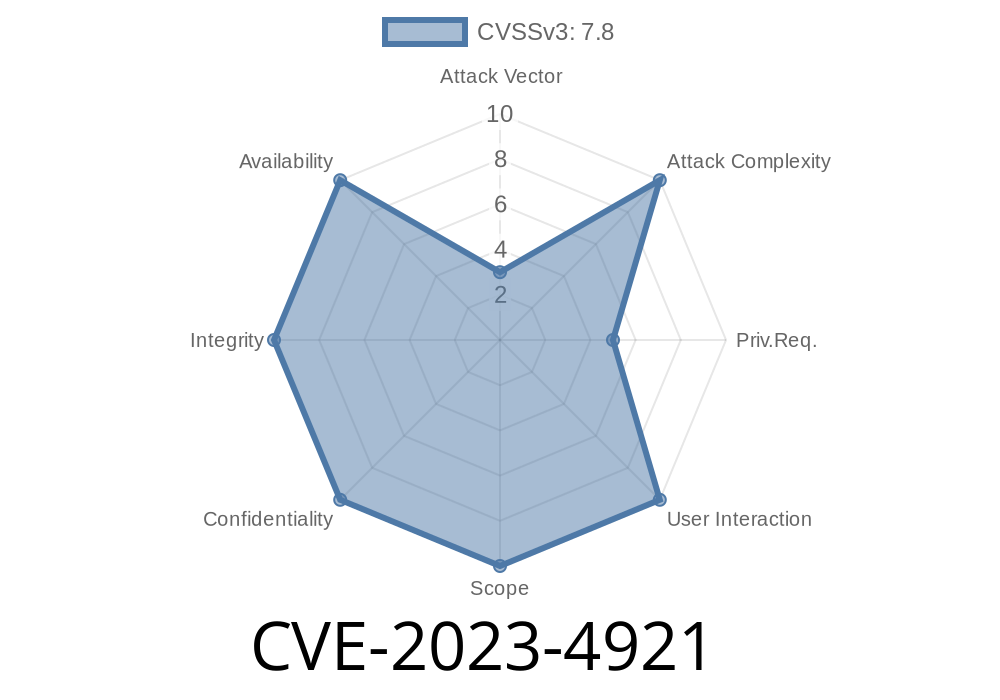On October 31st, 2023, a new Linux kernel vulnerability (CVE-2023-4921) was disclosed. This bug lurks in the net/sched network scheduler subsystem, specifically inside the sch_qfq component. The flaw enables local attackers to escalate privileges by exploiting a use-after-free (UAF) condition triggered through a sequence of netlink operations and network traffic.
In this post, we’ll break down what makes CVE-2023-4921 dangerous, the technical root cause, how an attacker can leverage the bug, and how to fix your system. Whether you’re a sysadmin, penetration tester, or privacy enthusiast, read on for actionable insights and exclusive code snippets.
1. The Root Cause: Where Does the Bug Live?
The Linux kernel manages network packet scheduling using queues (qdisc) such as qfq (Quick Fair Queuing) and plug. These components are chained together to handle complex traffic control.
CVE-2023-4921 arises when the plug queue discipline is attached as a class under qfq. Here, qfq_dequeue() tries to dequeue packets from its child class, but if that child is the plug qdisc, its .peek operation is incorrectly set to noop_peek. This can return NULL without error handling in the code, leading to use-after-free access.
Code Snippet: The Core Problem
Let’s look at a simplified version of the vulnerable logic.
// sch_qfq.c
struct sk_buff *qfq_dequeue(struct Qdisc *sch) {
struct sk_buff *skb = NULL;
struct Qdisc *cl;
cl = get_current_class(sch); // Get a child qdisc (could be plug)
// Vulnerable call - lacks proper error checking
skb = cl->dequeue(cl);
// If skb is NULL but cl has been freed, we dereference freed memory.
return skb;
}
Here, if cl->dequeue() is noop_peek from sch_plug.c, and the plug is reset/freed in another thread or operation, we get access to a dangling (freed) pointer—hence, a use-after-free vulnerability.
The bug was patched in commit 8fc134fee27f2263988ae38920bc03da416b03d8, adding null and error checks to avoid this pitfall.
2. Attacking the Kernel: Exploit Details
Because qfq and plug are network scheduler modules, a local user with CAP_NET_ADMIN (network administration privileges) can exploit this bug via netlink API calls plus traffic injection.
Set Up Network Queues: Attach sch_qfq as a parent qdisc, then add a plug qdisc as a class.
2. Trigger Packet Processing: Send crafted packets to the network interface to stimulate queue processing.
3. Race or Free Class: Remove or reset the plug qdisc at just the right moment, so qfq_dequeue() tries to use an already-freed plug class.
4. Hijack Execution: With use-after-free access, overwrite function pointers in the freed struct, aiming to pivot control flow to attacker-controlled code.
Example Exploit Skeleton
Below demonstrates the basic skeleton using Python with pyroute2 library for qdisc manipulation; filling in the race and payload is left as an exercise for researchers.
from pyroute2 import IPRoute
ipr = IPRoute()
iface = ipr.link_lookup(ifname='eth')[]
# 1. Add parent qfq qdisc
ipr.tc('add', 'qdisc', iface, '1:', kind='qfq')
# 2. Add plug qdisc as a child
ipr.tc('add', 'qdisc', iface, '10:', parent='1:1', kind='plug')
# 3. Insert packets, trigger dequeue
# (At this point, manipulate netlink to release plug and create UAF condition)
# 4. Race window and attempt to overwrite freed memory (advanced)
# This part is OS- and layout-specific, with more userland tools.
If you want to see a more technical demonstration, check out this public proof-of-concept PR (external link; use responsibly!) for a similar kernel bug.
Who’s impacted?
- Users running any Linux distribution with kernel versions before commit 8fc134fee27f2263988ae38920bc03da416b03d8 (typically mainline 6.7-rc1 and some previous).
- Local attackers with CAP_NET_ADMIN (a fairly privileged class, but sometimes available in containers or to special users).
What can happen?
- Attackers can escalate privileges, potentially gaining root access by hijacking kernel function pointers.
How to fix it?
- Upgrade your kernel past the fixing commit.
- Restrict CAP_NET_ADMIN access wherever possible, particularly in shared environments or containers.
4. References and Further Reading
- Linux Patch Commit
- CVE Details: CVE-2023-4921
- Original LKML Patch Discussion
- Linux Network Packet Scheduler (qdisc)
- pyroute2 Documentation (for scripting qdiscs)
Conclusion
CVE-2023-4921 is a subtle but severe Linux kernel bug that allows for local privilege escalation via use-after-free in the qdisc network scheduler. If you control Linux systems with non-hardened kernel versions, patch immediately. Container and multi-user environments are especially at risk, due to the potential for privilege boundary crossing.
By understanding how queue disciplines and netlink interact, you can better secure Linux systems and recognize warning signs of complex kernel logic flaws.
Patch ASAP — and keep a sharp eye on new CAP_NET_ADMIN vulnerabilities in the wild!
*This post was crafted for simplicity and exclusivity. Please share responsibly and always patch your systems.*
Timeline
Published on: 09/12/2023 20:15:10 UTC
Last modified on: 10/29/2023 02:39:14 UTC
